In today’s day and age with frequent cyber attacks and dangerous public WiFi networks, people are looking to get a VPN for online privacy. However, while many providers promise just that – and more – not many of them do an impressive job in this regard.
Proton VPN is a very interesting provider that offers both a free and paid plan. For that reason, it’s an imminent choice for many people who want to experience both sides of the spectrum. But is Proton VPN safe and secure? Should you even consider using this provider?
These two questions are very relevant when choosing not only this but also any other provider. After all, the VPN you’re using must display the highest level of security and privacy. Otherwise, the purpose of using this service is non-existent.
Today, I’ll answer the question “Is Proton VPN safe and secure?” and talk about its security features, logging practices, and IP/DNS leaks (if there are any). It’s not going to be a long read but make sure you stay with me to see how safe this provider actually is.
Is Proton VPN Safe? A Quick Overview
Our analysis concludes that Proton VPN is indeed safe. It offers features like:
- 256-bit encryption
- Kill switch
- Secure Core servers
- NetShield ad blocker
- WireGuard
- No-logging policy
- RAM-only servers, and many more.
In our tests, Proton VPN displayed staggering results, with no IP/DNS leaks or any signs of endangering our privacy. If you’re thinking about getting it, you have a green light from our team. Claim its exclusive discount on the button below.
Is Proton VPN Safe to Use? Security Features Examined
Proton VPN’s constant improvement over the years brought some great security features. Today, the provider is among the feature-richest services on the market, both when talking about its free and paid versions. Here are which security features you can expect from this VPN.
Bank-Grade Encryption
The company uses bank-grade encryption also known as 256-bit AES encryption by many. This level of encryption is used by pretty much any provider, even including some free VPNs. Is this a bad thing? Absolutely not. It is, in reality, a great thing regarding your security.
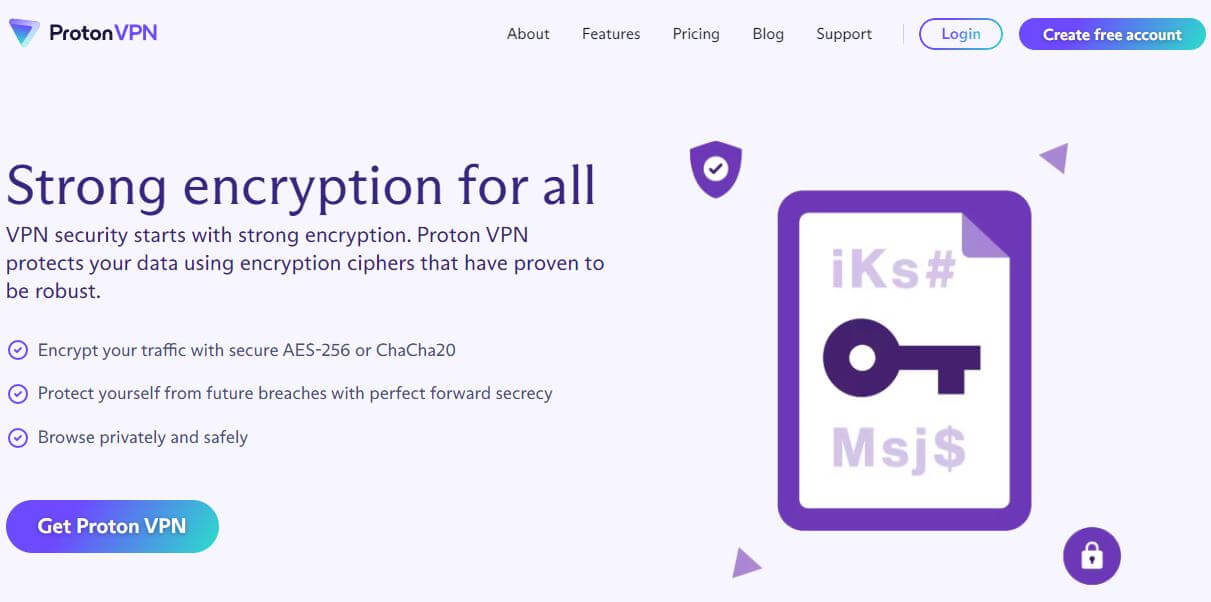
This level of encryption is impenetrable and even if you’re dealing with a skilled hacker, he won’t be able to breach it. Thus, when your connection is protected by 256-bit AES encryption, you can be sure that no one will be able to track your connection and spy on your online activities.
Kill Switch
This provider offers an automatic kill switch as well and I like that you can enable it from the home screen of the app. It doesn’t have an advanced kill switch like NordVPN, for example, which I highlighted in my Proton VPN vs NordVPN duel.
However, I can assure you that this simple kill switch works really well when you lose a VPN connection. I rarely experienced any problems with this provider but a few times that this happened over the course of a few years, Proton VPN promptly shut down my internet connection to prevent potential leaks.
The provider also offers a so-called permanent kill switch if that’s what you want. It will completely shut down your internet connection when not using a VPN. This way, you must connect to a VPN server to be able to use your internet – similar to what NordVPN offers.
WireGuard Support
When answering the question about the safety and security of Proton VPN, it’s vital to talk about its protocols. Besides, they’re the backbone of connection security, and having up-to-date protocols is crucial. Thankfully, this provider follows all trends and includes WireGuard.
WireGuard can be found in CyberGhost and Surfshark too and this protocol is currently among the fastest on the market. It’s not faster than ExpressVPN’s Lightway protocol but it’s very close, both in terms of performance and security.
Proton VPN includes OpenVPN as well, just in case you want to go for an old-school solution that works wonders even in 2025. Still, WireGuard is my protocol of choice and you can make it your primary protocol in the Settings menu of the application.
Alternative Routing
Proton VPN offers something titled Alternative Routing. It’s a measure of bypassing censorship, where the provider routes your connection through third-party networks when you can’t access any of its servers. This can be handy in China, for example.
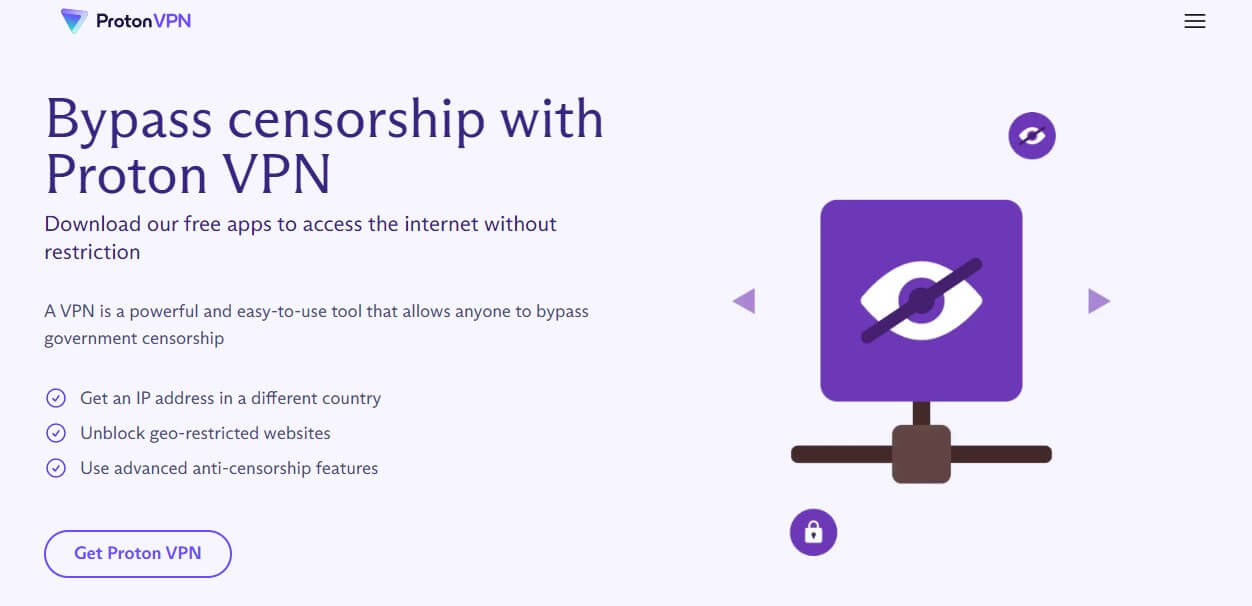
If you can’t connect to Proton VPN, enable Alternative Routing and let the provider do the job. While this VPN usually doesn’t work in China according to the company, it might be worth a shot in some regions where censorship isn’t that strong.
This is indeed a crucial security feature because it lets you stay safe and secure by allowing you to use a VPN where it, in theory, shouldn’t work.
Stealth Protocol
macOS users have access to the Stealth protocol. Does this mean that Proton VPN is safe and secure on macOS more than on any other platform? No, but the Stealth protocol is good for masking your VPN connection to again, get over certain forms of censorship.
It’s based on WireGuard tunneled over TLS, so you get great performance with no cut edges regarding security and privacy. The only downside is that Stealth VPN is available only on macOS, so you’re limited to Alternative Routing if you’re not using a Mac.
Forward Secrecy
Forward Secrecy isn’t a revolutionary feature, however, it’s more than handy. This feature generates a new encryption key each time you connect to a VPN. Instead of always having the same encryption key and being in danger of a compromise, you get Forward Secrecy.
Now, when you connect to the VPN, a new key is assigned, preventing hackers and snoopers from tracking you. Even if the future encryption key is captured and decrypted, it won’t have any influence, as Proton VPN never reuses its encryption keys.
Secure Core Servers (Premium)
Secure Core servers are one of the main selling points of this provider. Coincidentally, this is a premium feature so you do need to buy a subscription to use it. Secure Core is a feature that will route your traffic through 3 different server locations, which adds to your privacy and anonymity.
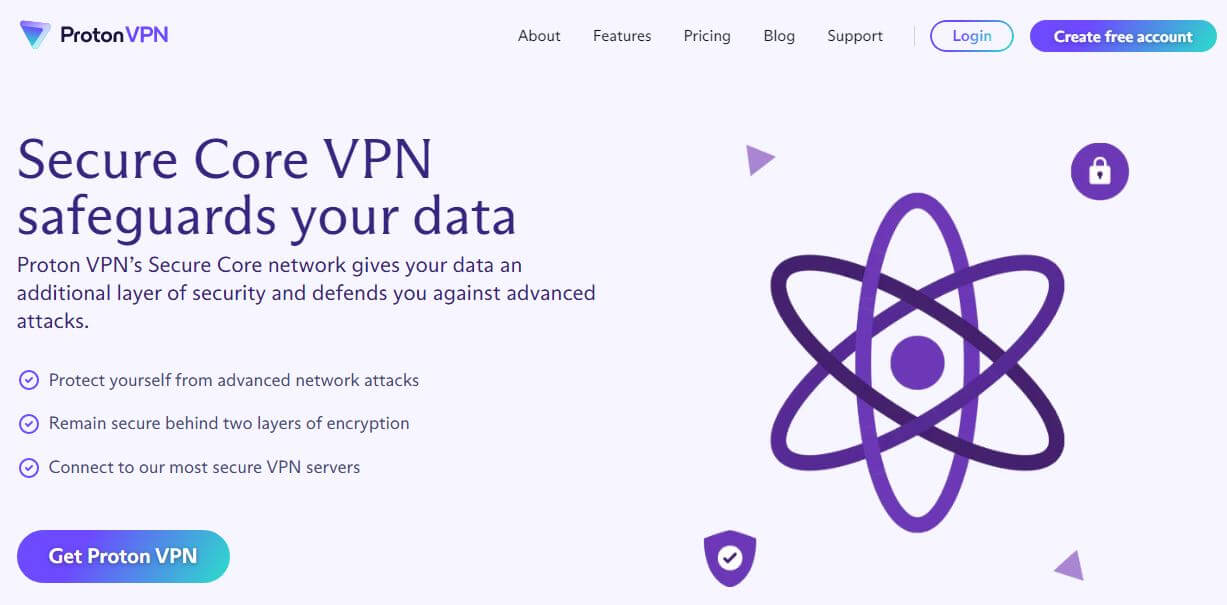
If your connection is routed through 3 servers in different countries, you get double the encryption, which makes your connection untraceable by any hacker, ISP, or government body. Secure Core servers are based in Switzerland, which is great for privacy too.
Besides, Switzerland is known for privacy-friendly laws that will help you stay off the radar and browse the web safely and anonymously. That is if you buy Proton VPN because you won’t find this feature in the free version.
NetShield (Premium)
Another premium feature is NetShield. Is Proton VPN safe and secure when it comes to blocking ads and trackers? Well, glad you asked because NetShield is a very reliable ad blocker that will remove ads, trackers, and malware, making your browsing experience much safer.
What’s more, you can set it to block only malware, but if you want to ensure maximum security, you can set it to block all three factors – malware, ads, and trackers. I recommend doing the latter as it’ll significantly decrease the number of ads you see online.
IPv6 & DNS Leak Protection
Lastly, I think we should mention the presence of IPv6 and DNS leak protection, which is very important for preserving your privacy. DNS leak protection is always on by default and there’s no way of turning it off.
IPv6 can be turned on or off but I recommend keeping this option always enabled, especially if you have an IPv6 address that you need to protect. This, in conjunction with a kill switch, will ensure you’re browsing the web anonymously without the possibility of unwanted leaks.
Does Proton VPN Store Logs? Analysis of Its Privacy Policy & Jurisdiction
Is Proton VPN safe? Having in mind all of its security features, the answer to the question is indeed positive. However, there’s another important thing to talk about and that’s the company’s privacy policy. If a provider stores logs, it’s immediately a no-go for us.
But is this provider notorious for storing logs and selling your data to third parties? I’m gonna need to be honest with you – NO!
Where Is the Company Based?
If you’ve read this article carefully, I mentioned that this provider is based in Switzerland. In my full review of Proton VPN, I talked about why this is a great thing to know. First, Switzerland’s privacy laws are very stringent and the country doesn’t belong to 5/9/14 Eyes alliances.
This means there aren’t data-retention laws in the country that would force ISPs to spy on your activities or extract information from Switzerland-based VPNs. There’s a well-known term “Swiss Security” and this applies to Proton VPN as well.
With its great jurisdiction, you can be sure the provider will never be obligated to hand out any user-related information to the authorities or third-party companies, which grants you complete privacy.
Is Proton VPN Safe in Terms of Logging Practices?
Even if someone forces this company to hand out user-related logs, it would come out empty-handed. Why? Because it stores absolutely ZERO logs of sensitive information on its servers. Plus, it uses RAM-based servers that wipe every bit of information upon restart, which enhances your privacy even more.
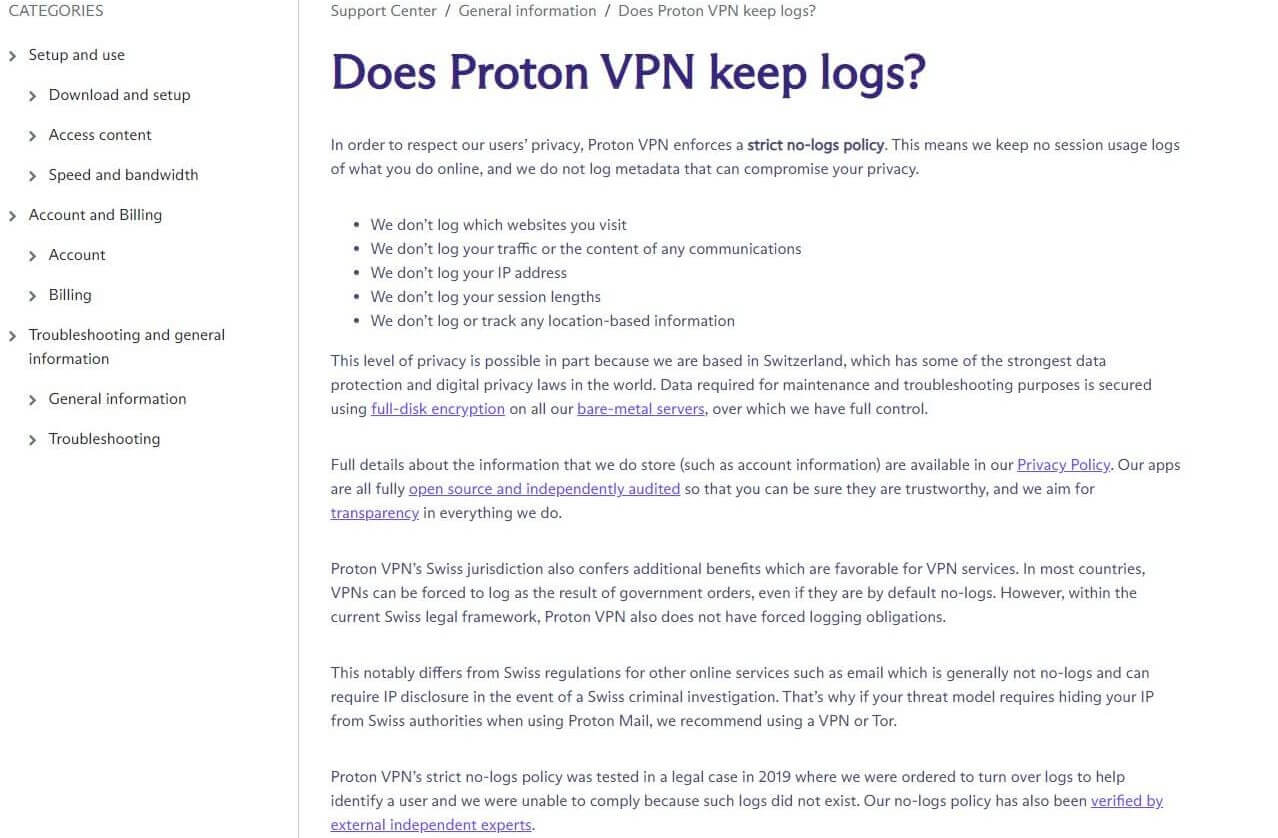
In the screenshot above, you can see a short excerpt from Proton VPN’s privacy policy. As you can see, it stores no logs of visited websites, IP addresses, session lengths, geolocation, browsing history, or anything else.
The only information that the company logs has to do with anonymized analytics used for troubleshooting purposes and making sure that the service works properly. This information can’t be traced to your identity in any way, so you can rest assured your privacy is well-preserved.
In addition, it’s vital to state that the provider has an independent audit by SEC Consult. This auditor examined the provider’s security infrastructure and its no-logging policy to make sure everything functions well, and the company confirmed it shortly after running its tests.
In 2019, the company proved that it stores no logs in a legal case where the authorities tried to extract user-related information from Proton VPN. For good or bad, they couldn’t identify the users because they found no logs on the VPN’s servers.
IP & DNS Leak Tests: Let’s See if There Are Any Leaks
Is Proton VPN safe and secure when talking about IP and DNS leaks? In other words, should you expect your IP and DNS addresses to leak frequently when using this VPN? Fortunately, the answer is NO and during my long haul with this provider, I had exactly zero leaks the whole time.
I tested Proton VPN on numerous occasions but to avoid making this article too long, I used the US server to show you my test results. Also, I did my IP/DNS leak test using two popular websites, such as ipleak.net and browserleaks.com.
On ipleak.net, I got some amazing results as the provider fully concealed my IP and DNS addresses, showing no signs of leakage.
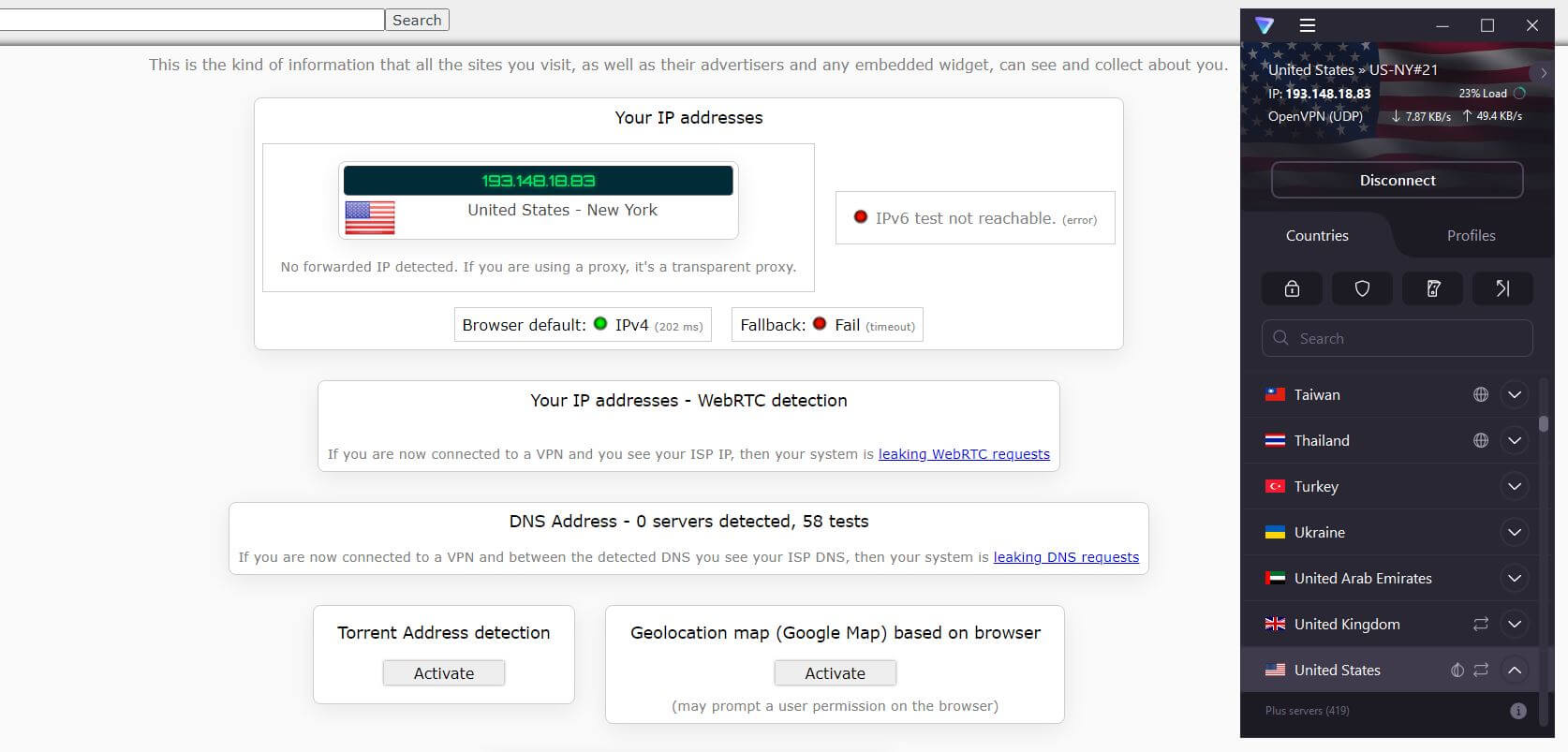
The same scenario repeated when I switched to browserleaks.com.
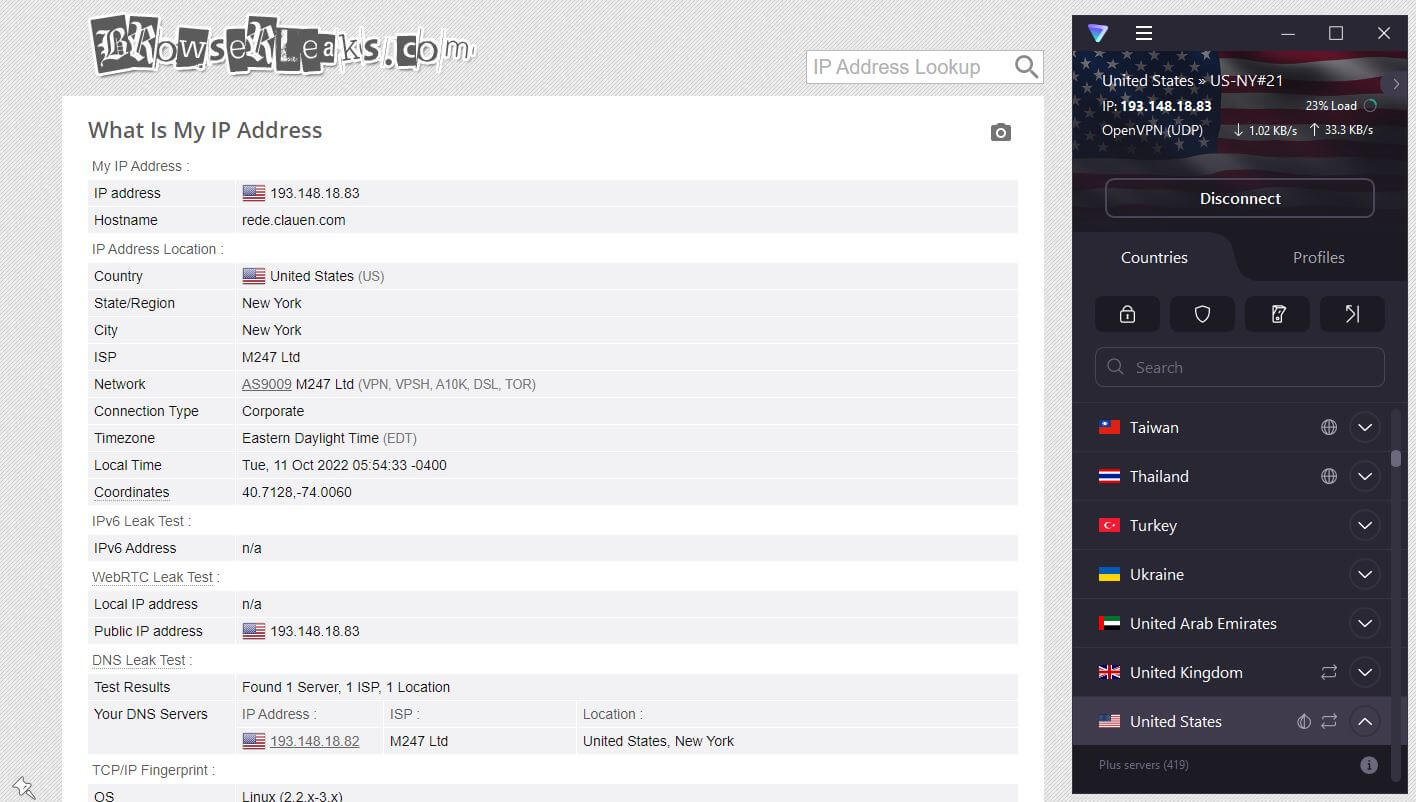
As you can see, when connected to a VPN server in the United States, the only addresses displayed are the ones from this country. Bear in mind that I’m from Eastern Europe, so any sign of leakage is out of the way.
So Is ProtonVPN Safe to Use?
To conclude this analysis, let’s answer the question once again. Is ProtonVPN safe and secure? Since it successfully passed all our tests and proved to have a boatload of security features, it’s easy to conclude that it IS safe and secure.
It has a certified no-logging policy, premium-grade features, no IP/DNS leaks, and a great history of providing an extreme level of privacy and security to both free and paid users. ProtonVPN’s only downside has nothing to do with its quality.
In fact, it’s a great VPN for streaming, torrenting, and everything else but it’s also a bit expensive compared to its rivals. If you seek uncompromising security and privacy, ProtonVPN is a solid choice, but if you’re on a budget, you can consider CyberGhost as a cheaper but equally safe and secure alternative.
Another option to consider is ExpressVPN, which, again, is equally safe. This VPN is faster as well, offering more server locations and currently 8 third-party security audits. If you’re interested, you can claim ExpressVPN’s 49% discount here.
If you’d rather stay with the Swiss VPN and enjoy its unrelenting security and privacy at a slightly costlier price, here you go. We left a button where you can get its exclusive discount or even test its free plan without paying a dime.